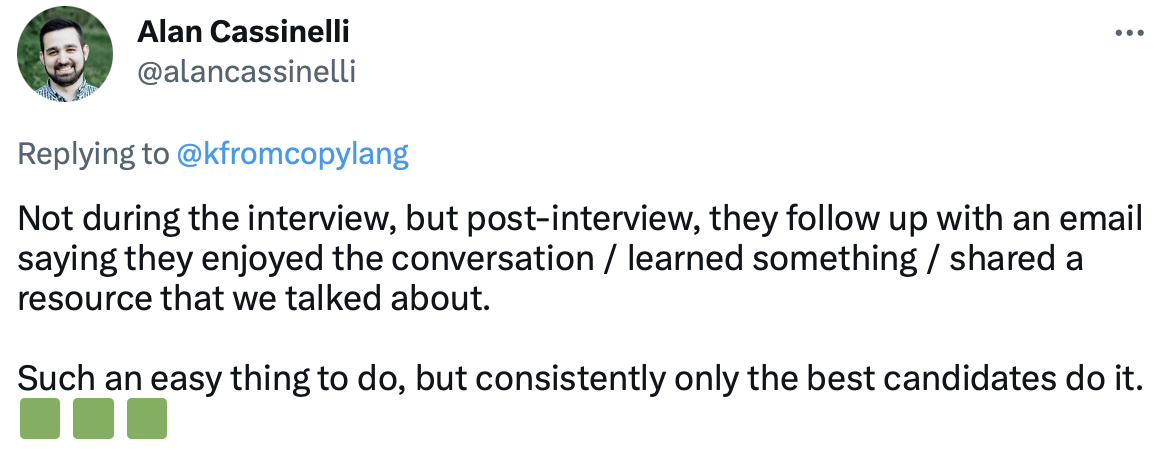In this post, we’ll address common recruitment challenges and explain how remote hiring can solve them, especially via virtual interviews.
This 30-minute window is your only chance to determine if a person would make a great addition to your team or not. As an employer or hiring manager, you need to have a keen eye for the subtle qualities that separate average candidates from excellent ones.
We asked seasoned founders and remote hiring managers about the traits that would make them say: “Yep, I’m hiring this person!” during the online interview — and we compiled them all below.
Here are 9 green flags that you should look out for when interviewing candidates over Zoom:
1. They care about the little things

One of the biggest differences between remote interviews and physical ones is that you have zero control over the applicant’s environment.
That said, candidates who are serious about the role will put more effort into how they present themselves on camera. Applicants who pick a quiet space, use natural lighting, and choose a neutral or professional virtual background, for example, are always a green flag in our book. Bonus points if they make an effort to improve sound quality and reduce background noise.
Their personal appearance also matters. They don't need to wear formal attire during the video interview (it's no secret that we're all wearing pajama bottoms at this point) or have a professional studio setup. They just need to be presentable and ready.
PRO TIP
Distractions are inevitable during Zoom interviews. Use this as an opportunity to gauge how a candidate reacts to the distractions around them, including any potential interruptions like cell phone notifications or background noise.
2. They did their homework
Keep an eye out for candidates who’ve done a little research about your company before hopping on the call.
“I remember a few candidates who had looked me up and listened to podcast interviews I'd done, and asked about them. I couldn't believe it,” shares Allen Walton, founder of Spyguy.
These candidates are not just shopping around. They're seriously looking for a place that can provide long-term growth. They feel confident that your company would be a good fit for them. Doing their homework is also a good indicator that they're prepared to answer your possible questions.
It’s a green flag when candidates know:
- What your company does
- Your target market
- Your company culture and values
- What challenges your industry is facing
- What they can bring to the table
Lastly, coming in prepared shows you a glimpse of the applicant’s work ethic and attention to detail. If they can spend that time researching for a company before they even get the job, imagine the effort they’d give once they actually get hired.
PRO TIP
Make sure you’ve got an informative company website so applicants can easily learn more about your organization. If you don’t have one up, hire a skilled web designer to help you out.
3. They can express themselves well
Virtual interviews are more enjoyable when job-seekers know how to express their ideas well. Since you'll be collaborating remotely, it's also important that your assistant knows how to get their ideas across through video conferencing software like Zoom, Google Meet, Microsoft Teams or Slack.
A green flag applicant is someone who’s:
- conversational
- easy to talk to
- able to communicate clearly, without using big, complicated words
For example, when you ask them a question about a certain process, they should be able to take you from Point A to Point B with ease.
Take note, though, that some Filipino assistants may appear shy or reserved at the beginning. Don't mistake this for lack of skill. Most of the time, they’re just nervous. Ease into the job interview by asking neutral questions or icebreakers.
Tone is also important. Abegail Pates, a talent sourcing specialist, highlights the importance of finding someone who can talk to you like a true collaborator:
“The candidate that talks to the interviewer like an equal gives the impression that they value themselves as much as they respect their co-workers. A job should be an equal arrangement after all.”
PRO TIP
Filipino work culture values hierarchy, so don’t be surprised if some applicants address you as “ma’am” or “sir”. Just remind them that it’s okay to call you by your first name.
4. They give detailed and specific answers

Interviews can be full of canned answers and sweeping generalizations. You’ve probably heard lots of applicants mention that their “greatest weakness is working too hard”. Heck, maybe you’ve used that line yourself, too.
According to Abegail, a candidate who “gives generic answers signals that they don't really know what they're talking about, or that their knowledge is just surface-level.”
Good applicant, on the other hand, offer concrete answers with specific examples. These are the right people you want in your company. Being able to give detailed answers shows the depth of their experience and subject-matter expertise.
Be on the lookout for applicants who can:
- back their resumes with real-life experience
- offer genuine insights to tough questions —
- — and walk you through their thought process.
For example, a strong candidate should be able to tell you about the biggest lessons they’ve learned from their previous role. They should also be able to cite specific scenarios or share how they plan on applying those lessons in the future.
Aside from technical knowledge, giving detailed answers is also a sign of enthusiasm and genuine interest in the role. You might even consider asking a few common interview questions to gauge how they approach familiar scenarios.
5. They’re upfront about the things they don’t know
What if the applicant doesn’t know the answer to your job interview question?
For managers like Tre Fuentes, the best course of action is honesty.
“You’ll always know if someone is only saying something to sound smart or maybe they thought that's what you wanted to hear.”
In cases like this, observe how the applicant responds to the question. If they admit that they don’t know the answer or lack the experience to talk about the topic at length, that’s a good sign! This shows that they’re aware of what they lack, and are willing to learn from others about it.
Honesty also goes beyond the interview. Good applicants don’t exaggerate their job experience, pad their resumes, or lie about their job history. Instead, they’re upfront about these details. Look for applicants who can honestly — but tactfully — answer tough questions like:
- Why are you leaving your current job?
- Have you had a boss you didn’t like?
- Can you tell me about a time when you made a mistake at work?
Lastly, showing a bit of vulnerability is a sign of self-awareness. If you want to hire someone who’s aware of their strengths and weaknesses and is willing to improve, this is a good metric to keep in mind.
6. They keep a level head — even when things don’t go as planned
A lot of things can go wrong during a Zoom interview: you could lose your internet connection, tools might stop working halfway through the call, or someone's cat might walk into the screen. A malfunctioning computer or poor lighting can also impact the experience.
An excellent candidate knows how to keep their cool even when things don’t go as planned. This is a great opportunity for you to gauge how they react during a setback. See if they’ve got a Plan B or if they can solve the problem in a calm and logical way.
“Interviews, whether virtual or in-person, can be difficult,” Tre says, “But if the candidate shows they are able to function under pressure, it's always a green flag.”
7. They ask insightful questions
Green flag applicants also ask insightful questions during the Zoom interview. This shows that the candidate is thinking about all the aspects of the position and not just the superficial side of it.
“When the candidate asks thoughtful questions about career growth, company metrics, and other people on the team, it's a good sign that they've done plenty of research and envision themselves working here,” shares Aswin Sibu, co-founder of Mixrank.
Create opportunities for assistants to ask you questions, ideally after you’ve conducted the interview. Encourage them to share what they think about the company, the role, and if they’ve got any questions for you. Make it a conversation!
If a candidate is familiar with screen sharing and uses it effectively during the interview, that can demonstrate their comfort with virtual platforms.
8. They don’t talk trash

It’s easy to talk negatively about a bad manager or a job you didn’t like, but it takes emotional intelligence to speak with objectivity. If a candidate can criticize a negative experience without badmouthing other folks, earmark their resumes.
This shows a level of professionalism that you’d like to have within your team. Observe how the candidate talks about their previous job or manager during the Zoom interview. They don’t have to sing praises, but they should at least be able to give honest feedback without assigning blame or attacking someone personally.
Another green flag is candidates who can keep confidential information to themselves. Remember: they’ll be your future employees. You don’t want them spilling your company’s information to strangers.
Learn more: 8 ways to share confidential information with remote Filipino assistants
9. Their post-interview attitude matters, too

Applicants will obviously put their best foot forward during the video interview — and that's great! But how do they act after the official interview is over? Do they relax a bit or are they still ill at ease? Try to notice if they can slip out of the “interview mode” and show a bit of their personality right before you end the call.
Another green flag: applicants who send in short but thoughtful emails after the interview. It's a good indication that they care about the job and probably had a great time interacting with you. Thoughtful follow-ups also show that they feel confident about the interaction.
How to spot these interview green flags
IIt's easy to spot a bad candidate from a mile away, but you need to know how to interview someone in order to recognize green flags during the next virtual interview. Here are a few things you can do to spot these traits:
Observe their non-verbal cues
Filipinos come from a high-context culture that uses a lot of non-verbal cues to communicate. You can probably learn more about them from their tone, hand gestures, body language, facial expressions, and how good they are at maintaining eye contact. Good eye contact can convey confidence, sincerity, and interest. Positive body language, like sitting upright or nodding, also demonstrates attentiveness and respect. That said, request to have your cameras on during this initial interview so that you can spot these cues.
Learn more: What’s Filipino work culture like?
Ask the right questions
Next, ask the right interview questions! Use the Zoom interview as an opportunity to help you uncover key areas like the candidate’s problem-solving chops or interpersonal skills.
Claire Lew, CEO of Know Your Team, compiled the best interview questions according to 1000+ managers. Here are some of them:
- If you had an entire workday with no meetings, obligations, or interruptions — what would you do?
- What is the project that you are most proud of?
- How do you know you’ve had a productive day at the office?
- Can you describe a company you would love to work in?
- Let’s say you were to be in this role — what would your biggest learning curve be?
Learn more: 11 interview questions you need to be asking
Take notes
Virtual interviews happen fast. These green flags often hide in the details, so make sure to take notes during the next video interview. If you can, ask permission from the applicants to record the interview for future reference.
Don’t schedule back-to-back interviews
Back-to-back interviews don't give you time to sit down and evaluate the conversation. Instead of talking to 3 different candidates in a row, for example, space each interview about 10 minutes apart. If you did a panel interview with some of your team members, take time to debrief. Share what you liked about the candidate and what stood out to you.
Bottomline: take time to digest each one so you don’t miss the little details.
Be on the lookout for these green flags
The interview is your only chance to get to know the candidate before making The Big Decision. It's important to spot these green flags during your virtual interviews, so you can hire the best candidate for the job.
Just make sure to test your internet connection, sound quality and camera before the next call to ensure you can make the best impression.
Here at Somewhere, we help our clients focus on the interview by doing all the nitty-gritty hiring tasks for them. All they have to do is let us know what they're looking for in the job description, and then show up to interview a shortlist of candidates. If this sounds like what you need, send us a message today and we'll help you start a search.
FAQs about online job interview green flags






.webp)
.webp)






